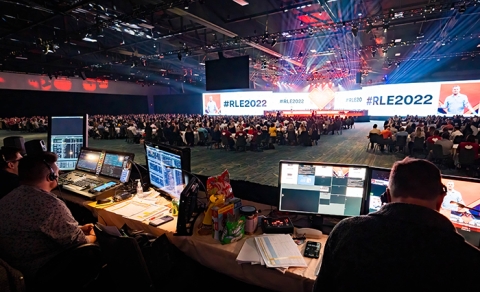Behind the Scenes: The Magic of Effective Event Productions
Behind the Scenes: The Magic of Effective Event Productions
Blog Article
Comprehending Exactly How Events Production Works: A Comprehensive Review of the Refine
The ins and outs of occasion production demand a methodical approach that incorporates numerous phases, each playing a critical function in the overall success of an occasion. Comprehending the subtleties of budgeting, source allotment, and on-site management is important for any kind of expert in this field.
First Preparation and Idea Advancement
Efficient preliminary preparation and concept advancement act as the foundation for successful events manufacturing. This stage involves defining the occasion's objective, target market, and preferred outcomes. A clear vision is essential; it overviews all succeeding decisions and helps straighten the group's efforts toward a typical goal.
Throughout this phase, conceptualizing sessions can be indispensable. Involving stakeholders, including customers, enrollers, and prospective attendees, fosters a joint environment that generates ingenious ideas. Additionally, thorough marketing research ought to be carried out to recognize trends, preferences, and possible challenges.
Once the concept is established, it is crucial to produce a detailed occasion synopsis. This overview ought to consist of the occasion's motif, style, and essential activities. Developing a timeline is similarly important, as it aids to take care of due dates and jobs successfully.
Budgeting and Resource Appropriation
With a solid principle in area, focus needs to transform to budgeting and resource allowance, which are crucial components in performing the event effectively. A well-defined spending plan serves as a roadmap, describing all expected costs and available resources - Event Productions.
Resource appropriation entails designating both economic and human sources to various jobs and components of the event. Prioritization is essential; important aspects should obtain appropriate funding while much less essential facets may require an extra conventional strategy. Moreover, backup planning is vital-- alloting a section of the budget for unforeseen costs can minimize monetary threats.
Furthermore, efficient interaction among team members pertaining to budget restrictions cultivates collaboration and development. This advertises the responsible use resources and encourages innovative options to stay within budget. Ultimately, a calculated approach to budgeting and resource allotment lays the foundation for a successful event, making it possible for coordinators to focus on delivering a memorable experience for guests while keeping economic stability.
Logistics and Sychronisation
Navigating the intricacies of logistics and control is necessary for the smooth execution of any type of event. This phase includes careful planning and organization to make sure that all components operate in harmony. Key aspects include venue choice, transportation arrangements, and the scheduling of various activities.
This consists of recognizing the design, access factors, and offered resources. Collaborating these components needs collaboration with suppliers, providers, and transport solutions to ensure prompt deliveries and pickups.
An additional essential aspect is the development of an extensive timeline that describes all logistical elements leading up to the occasion. This timeline functions as a roadmap, outlining essential turning points and due dates for tasks such as equipment setup, providing services, and audiovisual installments. Normal interaction with all stakeholders is essential to address any kind of prospective problems proactively.
Implementation and On-Site Management
Successful implementation and on-site management are critical for changing thorough strategies into reality during an event. This stage entails the seamless coordination of various elements, guaranteeing that every information aligns with the well established vision. On-site managers play a critical function, working as the main point of communication amongst suppliers, staff, and stakeholders. Their capacity to make real-time choices can dramatically affect the event's success.
A distinct routine is crucial, functioning as a roadmap for all tasks. Occasion supervisors should ensure that Get More Info arrangement happens in a timely manner, sticking to timelines for audio checks, catering shipments, and guest arrivals. Reliable problem-solving skills are additionally essential; unanticipated obstacles can develop, requiring quick thinking and adaptability to keep the occasion's flow.
In addition, focus to visitor experience is extremely important. Monitoring visitor communications, ensuring safety methods are complied with, and offering support personnel to address concerns fosters a positive ambience. This degree of interaction not only enhances the total experience however additionally shows the professionalism and reliability of the occasion group. Event Productions. Ultimately, effective implementation and on-site management rest on comprehensive prep work, efficient interaction, and a commitment to delivering a remarkable event for all involved.

Post-Event Examination and Comments
The end result of any kind of occasion lies not only in its execution however additionally in official site the extensive examination that follows. Post-event evaluation is essential for figuring out the total success of the occasion and identifying areas for improvement. This procedure commonly includes celebration responses from numerous stakeholders, including participants, vendors, and team participants, to obtain a comprehensive point of view on their experiences.
To structure the examination, occasion organizers commonly make use of studies and interviews, concentrating on key efficiency indicators such as participant satisfaction, logistical performance, and spending plan adherence. Assessing this data permits planners to analyze whether the occasion fulfilled its purposes and to recognize the strengths and weak points of the execution.
By systematically resolving feedback and implementing modifications, event experts can enhance their approaches, inevitably leading to even more impactful and effective occasions. In verdict, post-event examination is an important action in the event production process that ensures continuous growth and excellence in future ventures (Event Productions).
Final Thought

The ins and outs of event production demand a systematic method that integrates several stages, each playing an essential duty in the general success of an occasion.With a solid idea in location, interest needs to transform to budgeting and resource appropriation, which are vital elements in carrying out the event efficiently.Resource allotment entails assigning both human and monetary resources to different jobs and components of the event. Eventually, a tactical strategy to budgeting and source allotment lays the groundwork for an effective occasion, enabling coordinators to focus on delivering a memorable experience for guests while preserving financial stability.

Report this page